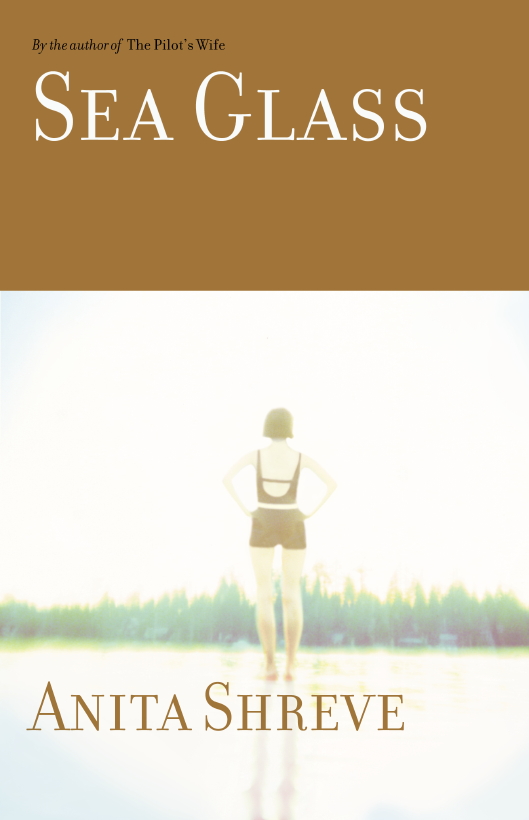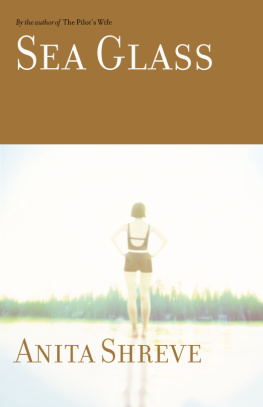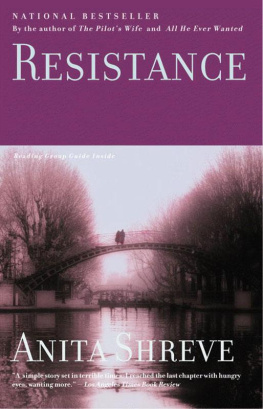
Honora
Honora sets the cardboard suitcase on the slab of granite. The door is mackereled, paint-chipped green or black, it is hard to tell. Above the knocker, there are panes of glass, some broken and others opaque with age. Overhead is a portico of weathered shingles and beyond that a milk-and-water sky. Honora pinches the lapels of her suit together and holds her hat against the wind. She peers at the letter B carved into the knocker and thinks, This is the place where it all begins.
The year is 1929. A June day. A wedding day. Honora is just twenty, and Sexton is twenty-four.
The clapboards of the house are worn from white to flesh. The screens at the windows are ripped and flapping. On the second story, dormers stand like sentries keeping watch over the sea, and from the house a thicket sharp with thorns advances across the lawn. The doorsill is splintered, and she thinks it might give way with her weight. She wants to try the pitted knob, though Sexton has told her not to, to wait for him. She steps down into the dooryard, her pumps denting the springy soil, unleashing a scent that collapses years.
Sexton comes around the corner then, his palms upturned and filled with dirt. He is a man with a surprise, a stranger she hardly knows. A good man, she thinks. She hopes. His coat billows in the breeze, revealing suspenders snug against his shirt. His trousers, mended at a side seam, are loose and ride too low over his shoes. His hair, well oiled for the wedding, lifts in the wind.
Honora steps back up onto the granite slab and waits for her husband. She puts her hands together at her waist, the purse she borrowed from her mother snug against her hip. Sexton has an offering: sandy soil, a key.
The soil is for the solid ground of marriage, he says. The key is for unlocking secrets. He pauses. The earrings are for you.
Honora bends her face toward the pillow of dirt. Two marcasite-and-pearl earrings lie nearly buried in Sextons hands. She brushes them off with her finger.
They belonged to my mother, Sexton says. The soil and the key are an old tradition your uncle Harold told me.
Thank you, she says. Theyre very beautiful.
She takes the key and thinks, Crossing the sill. Beginning our life together.
The man came into the bank with a roll of tens and fives, wanting larger bills so that he could buy a car. He had on a long brown coat and took his hat off before he made the transaction. The white collar of his shirt was tight against his neck, and he talked to Honora as she counted out the money. A Buick twodoor, he explained. A 1926, only three years old. It was the color of a robins egg, he said, with a red stripe just below the door handle. A real beauty, with wood-spoke wheels and navy mohair upholstery. He was getting it for a song, from a widow whod never learned to drive her husbands car. He seemed excited in the way that men do when thinking about cars that dont belong to them yet, that havent broken down yet. Honora clipped the bills together and slipped them under the grille. His eyes were gray, set deep beneath heavy brows. He had a trim mustache, a shade darker than his hair. He brushed his hair, flattened some from the hat, from his forehead. She had to wiggle the money under the grille to remind him of it. He took it, folded it once, and slipped it into the pocket of his trousers.
Whats your name? he asked.
Honora, she said.
How do you spell it?
She spelled it for him. The H is silent, she added.
O-nor-a, he said, trying it out. Have you worked here long?
They were separated by the grille. It seemed an odd way to meet, though better than at McNivens, where she sometimes went with Ruth Shaw. There a man would slide into the booth and press his leg against your thigh before hed even said his name.
Im Sexton Beecher, the handsome face dissected by grill-work said. At the next window, Mrs. Yates was listening intently.
Honora nodded. There was a man behind him now. Harry Knox, in his overalls, holding his passbook. Growing impatient.
Sexton put his hat back on. I sell typewriters, he said, answering a question that hadnt yet been asked. The courthouse is one of my accounts. I need a car in my job. I used to borrow my bosss Ford, but the engine went. They said it would cost more to fix it than to buy a new one. Dont ever buy a Ford.
It seemed unlikely she would ever buy a Ford.
The courthouse employed at least half of the adults in town. Taft was the county seat, and all the cases went to trial there.
Enjoy the car, Honora said.
The man seemed reluctant to turn away. But there was Harry Knox stepping up to the grille, and that was that. Through the window at the side of the bank, Honora caught a glimpse of Sexton Beecher buttoning his coat as he walked away.
Sexton tries the switch on the wall, even though they both know there is no electricity yet. He opens doors off the hallway so that light can enter from other rooms with windows. The floorboards of the hall are cloudy with dust, and on the walls a paper patterned in green coaches and liveried servants is peeling away at the seams. A radiator, once cream colored, is brown now, with dirt collected in the crevices. At the end of the hall is a stairway with an expansive landing halfway up, a wooden crate filled with a fabric that might once have been curtains. The ceilings, pressed tin, are nearly as high as those in public buildings. Honora can see the mildew on the walls then, a pattern competing with the carriages and footmen. The house smells of mold and something else: other people lived here.
She enters a room that seems to be a kitchen. She walks to a shuttered window and lifts the hook with her finger. The shutters open to panes of glass coated with a year or two of salt. A filmy light, like that through blocks of frosted glass, lights up an iron stove, its surface dotted with animal droppings. She twists a lever, and the oven door slams open with a screech and a bang that startle her.
She bends and looks inside. Something dead and gray is in the corner.
She walks around the kitchen, touching the surfaces of shelves, the grime of years in the brush strokes of the paint. A dirty sink, cavernous and porcelain, is stained with rust. She gives the tap a try. She could budge it if she leaned her weight against the sink, but her suit is still on loan from Bettes Second Time Around. The butter yellow jacket with its long lapels narrows in nicely at the waist and makes a slender silhouette, a change from a decade of boyish dresses with no waists. She shivers in the chill and wraps her arms around herself, careful not to touch the suit with her hands. There are blankets in the car, but she cannot mention them so soon. She hears footsteps on the stairs and moves into the hallway just as Sexton emerges from the cellar, wiping his hands on a handkerchief.



 Honora
Honora






